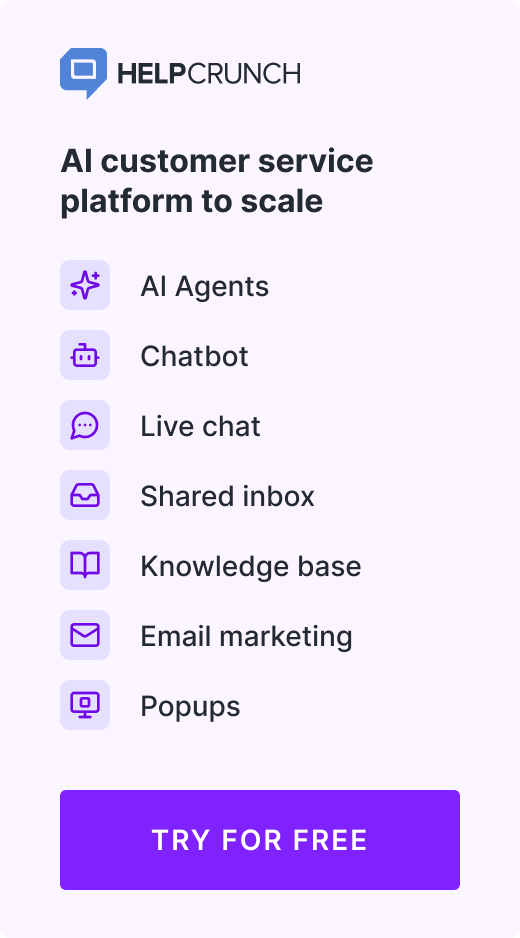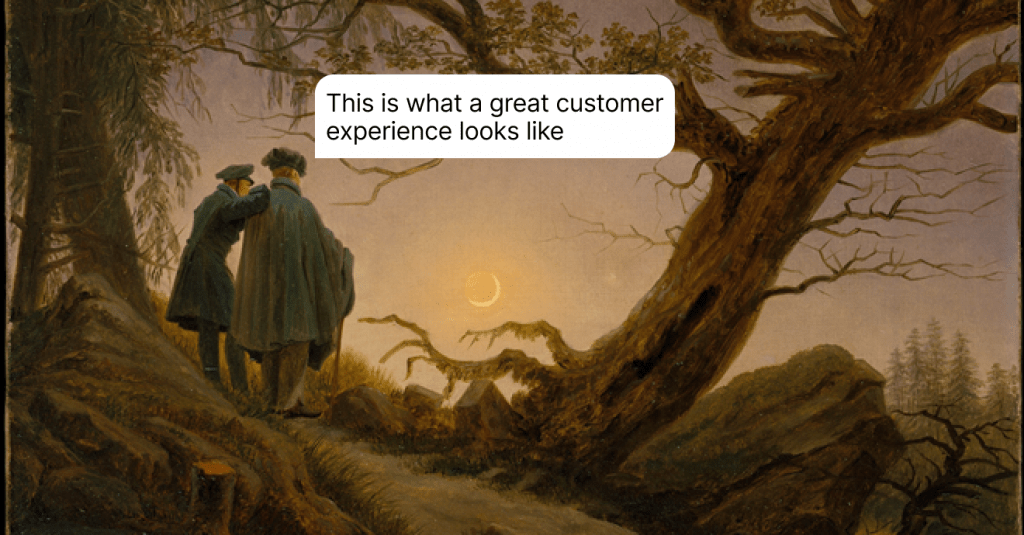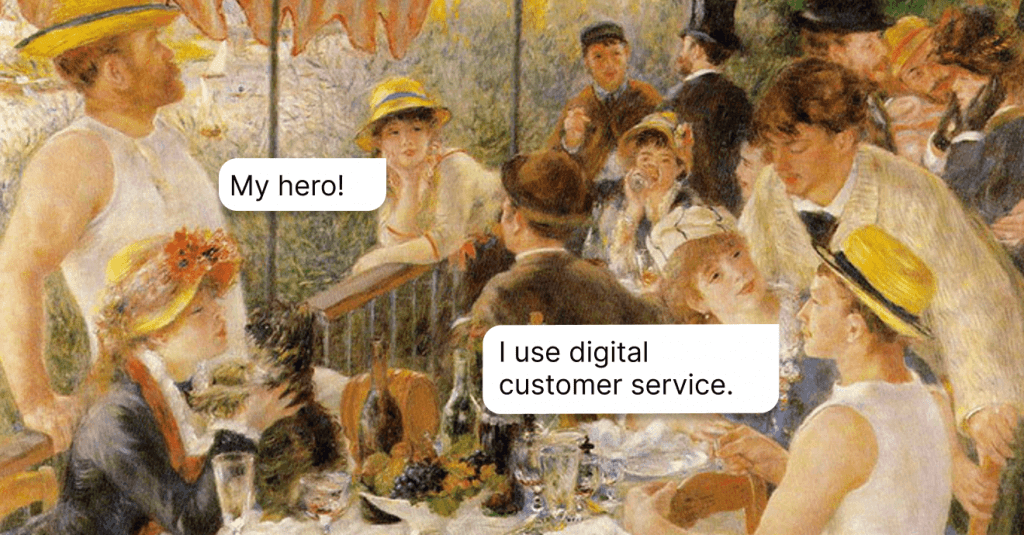Client vs Customer: What Is the Difference?
Does your business have customers or clients? We at HelpCrunch decided to find the difference once and for all.
Written by Anastasiia Khlystova

Full disclosure.
I’ve been using the words ‘client’ and ‘customer’ interchangeably for five years now (wow, it’s been five years already since I started my content marketing path, who would have thought).
The thing is, when you write about a business, you always need more ways to name people who are using your services or tools. It’s all pretty much the same for me – clients, customers, users, subscribers, consumers, you name it. Or is it?
Turns out the ‘client vs customer’ conundrum is one of the biggest mysteries in the business world — right between ‘who on Earth had ever used Google+’ and ‘why Facebook is still a thing after all the scandals’.
There are numerous articles on the topic of ‘client versus customer’, people keep asking this question on Quora on an all too regular basis – but there’s still no clarity there. Is there any difference between customers and clients? And if so, what is it?

‘Customer’ definition
Definition: In brief, a customer is a person or organization that buys products or services from a business. Stores or restaurants have customers.
It’s more about one-off transactions than lasting relationships. Even though customers can be loyal to brands and return to them regularly, the nature of their relations is always short-term. Customers choose whatever services they need and pay right away. They can come later to the same store, but it’s always about the immediate exchange of goods or services for money.
Traditionally, businesses that work with customers are focused more on the number of transactions rather than the quality of relationships with each consumer.
It may even seem that the word ‘customer’ gained itself a hint of negative definition, but it’s far from the truth. I mean not for nothing do they say that the customer is always right. They are the main patrons of every business, so yeah, it’s for them to demand top-notch quality goods.
To give you a better idea of the matter, just see how media use the word ‘customer’ in day-to-day news:
- The internet is awash with unhappy Ikea customers and an inability to be able to talk to someone is a repeated complaint. (The Guardian)
- Tesla Inc. customers in California and several East Coast states sued the company over what they called unexpected and steep price hikes for the company’s Solar Roof product. (Bloomberg)
- Santander has said “key services are recovering” following customers’ problems accessing accounts online and withdrawing cash from its ATMs. (BBC)
So as you see, banks usually have customers since they offer the same services and products for all physical clients. When it comes to entities and closer professional relationships, banks may offer personalized support.
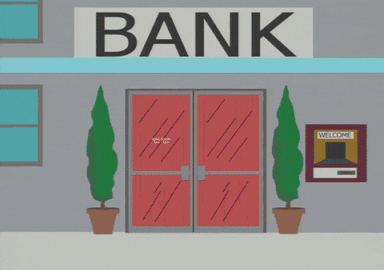
‘Client’ definition
Definition: A client is a person or business that pays for personalized or highly professional services like legal advice, graphic design, real estate consultation. For example, it’s commonly considered that attorneys and accountants have clients, not customers.
It’s a long-standing relationship. People can be your clients for years paying you regularly or only from time to time when they need your help. I’d say it’s a question of loyalty when it comes to clients. That’s why the spotlight of such companies or professionals is the happiness of their clients, not their number.
The key part here is all about being highly specialized and personalized. Clients receive services tailored specifically for their needs. If a person’s seeking financial advice, they’ll receive tips applicable to their situation only. If they’re hiring a lawyer, their case will be handled with all possible attention.
As Paul Davis, CEO of Bite-Sized Books, put it so accurately in his answer on Quora:
At a deeper level, by using the word client there is a semantic benefit, in that it removes the immediate cash exchange from the picture. In that way, having taken the concept of money out of the picture, it makes the relationship more equal and gives an impression of some form of quasi-partnership. It is an illusion of course, but it is one that the professional services organizations are very jealous of.
Here is the word ‘client’ used in English in the top world media:
- Will attorney-client privilege apply to Giuliani’s communications? (Reuters)
- Celebrity stylist gives free haircuts to isolated NYC clients (NBC New York)
- I’m an accountant for ultrawealthy people in Florida. Here’s what surprises my clients most about their taxes — and what I love about my job. (Business Insider)

Client vs customer: key differences
In a nutshell, a customer is someone who pays for here-and-now goods and services. While a client buys long-term personalized assistance or support from a hired professional.
Truth is, client and customer are pretty similar notions with the main difference lying somewhere between money and loyalty. From what I understood after thorough research, the word ‘customer’ is more about one-off purchases. Whereas, the word ‘client’ describes something more personalized, long-term, and ongoing.
Simply put, customer = immediate transactions, client = lasting relationships. For example, when you go to a street market and buy a painting from an artist, you become their customer. But if you ask that very artist to paint your family portrait, you are transforming into their client.
Yet, is it all that simple? Nowadays, brands tend to build long-run relations with customers as well by creating emotional connections and engaging influencers. To prove my point, I am gonna ask you a few questions. Do you follow any of your favorite brands on Instagram or Twitter? Do you react to their posts, share comments? If yes, then it’s definitely not a one-off relationship.
Talking about personalization, that’s also something customers can get easily today! You can order personalized coffee with your selfie at lots of cafes around the world. So, if you order a regular cappuccino – you are a customer, but if you order a cappuccino with your selfie… Then you become a client? Not exactly.

Let’s go through some examples.
Customer vs client comparison table
Just to give you an idea, here are some examples of businesses that have clients versus customers:
| You have CLIENTS if your business is… | You have CUSTOMERS if your business is… |
| Law firm | Retail store |
| Design studio | Supermarket |
| Accounting firm | Restaurant |
| Health care provider | Bank |
| Insurance agency | SaaS product |
| Advertising agency | Service station |
| Real estate agency | Amusement park |
‘Client and customer’ synonyms in business
Let’s be honest. In the B2B sector, these semantic borders are blurred. No one will be throwing rotten tomatoes at you if you use both of the terms, but even then it can be not enough.
Thankfully, there are other words in the English language (sending my love to the Oxford dictionary for this one):
- Consumer is a person who actually uses a product. Customers can buy stuff, but not necessarily use them, while consumers are its end users.
- User is a person who uses a product, especially when it comes to software and apps.
- Patron is a customer of a shop, restaurant, etc., especially a regular one. Yeah, I know, not your ordinary word choice, but I don’t see why not.
- Buyer is a person who makes a purchase. This term can also be used for a person employed to select and purchase things for a large retail or manufacturing business, which can be a little confusing.
- Follower is usually used in relation to social media. To be more specific a follower is someone who is tracking a particular person, group, organization, etc. on a social media website or application.
- Subscriber is a person who receives a publication or a service regularly by paying in advance. This one is actually my personal favorite, too.
Check out our article with best responses to rude customers — it will help your support team deal with customers or clients who are being impolite.
So, do I have clients or customers?
For non-native English speakers, the difference between a client and a customer can be even more confusing. Here is a fun and straightforward explanation by an English teacher:
Now, if you’re still confused about where your business stands on the ‘clients versus customers’ thing, you can still use all these other words.
As a software provider, you can have users of your product. If it’s a subscription-based service, people become subscribers. And if you manage to build a strong community around your business, loyal users will become community members.
Client vs customer: B2C use case
The business-to-consumer sector can have both clients and customers depending on what services a business provides.
If you work with each person or organization separately with a great level of personalization, then you have clients. And if your services or products are the same for everyone, then it’s customers.For instance, Disruptive Advertising, the second-best marketing agency worldwide in 2021, works with clients. The company offers personalized assistance and builds strategies for each organization separately.
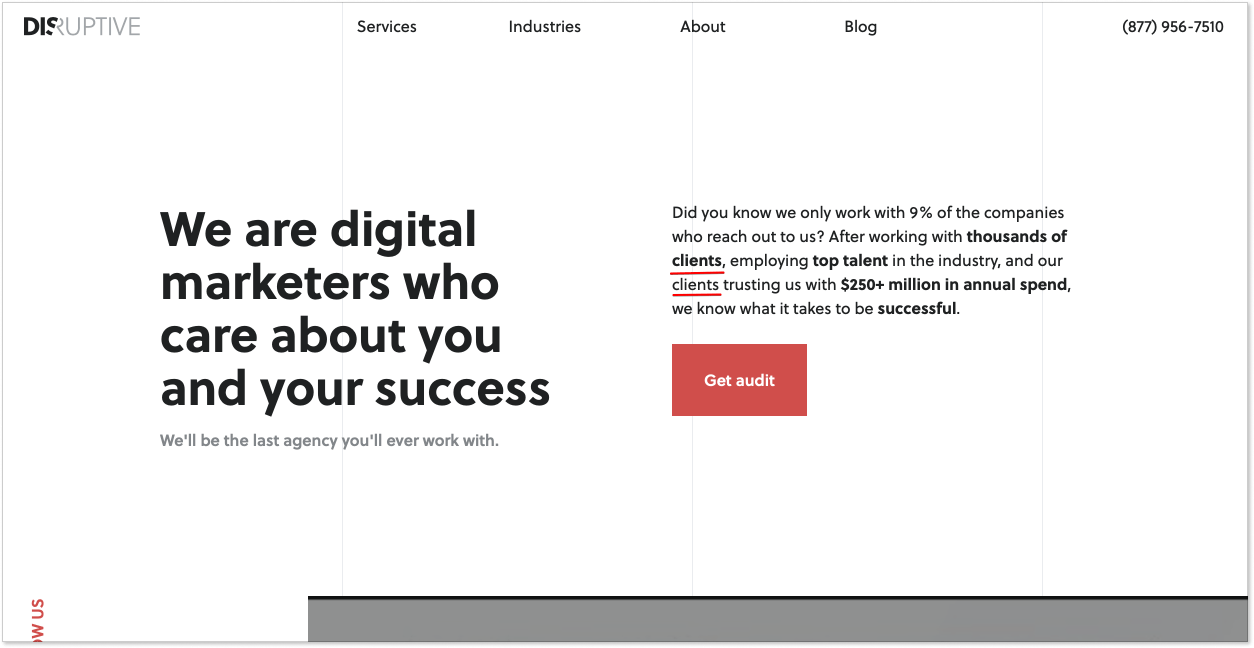
Client vs customer: B2B use case
Oppositely, if you run a SaaS or product business like HelpCrunch (yours truly), then we’re talking about customers here. People come, choose whatever services they need, pay money, and just use them. We don’t sign any agreements and don’t build our toolset from scratch for each user separately. They can be your brand advocates, comment in a customer community created by your team, and stay loyal to your brand.
Say what you will, but I really like the word ‘customer’. Suffice it to look at all the key things B2B companies hold so dear. They provide CUSTOMER service and struggle to collect CUSTOMER feedback. At the end of the day, it’s all about CUSTOMER satisfaction. These are all important metrics that every business wants to grow and improve.
So please don’t you think that the word ‘customer’ is somehow more general and shallow in comparison to ‘client’.
Robyn Kyberd, a business development consultant, suggests that “it’s probably better to think of a client as a particular type of customer: one who receives professional services, rather than something fundamentally different on account of the ongoing nature of the relationship.”
By all means, clients or customers, you can still make your services personalized. For instance, we at HelpCrunch do provide a personal onboarding assistant to every newcomer on top of having attentive and helpful customer support (a customer-centric selling methodology in action).
Or, returning to that selfie coffee, there are no restrictions on personalizing your offer in the business-to-customers section.
Summary
As a linguistics degree holder, I’ve always appreciated the true power of language. For decades, some people have been confusing words like their/there or your/you’re, which made a lot of people like me very angry and sad.
And even though the choice between ‘a client’ and ‘a customer’ isn’t that pressing, things like good spelling, grammar, and punctuation represent your brand to the world and, generally, make a better impression.
That is why it’s so important to carefully choose your words and pay attention to their meanings.

